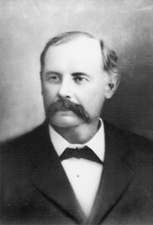James Westcott III facts for kids
Quick facts for kids
James Diament Westcott III
|
|
|---|---|
 |
|
| Justice of the Supreme Court of Florida | |
| In office July 1868 – January 1885 |
|
| Appointed by | Harrison Reed |
| Preceded by | Samuel J. Douglas |
| Succeeded by | George P. Raney |
| 7th Florida Attorney General | |
| In office July 4, 1868 – July 1868 |
|
| Governor | Harrison Reed |
| Preceded by | John B. Galbraith |
| Succeeded by | A. R. Meek |
| Member of the Florida House of Representatives from the Leon district |
|
| In office 1866–1866 |
|
| Personal details | |
| Born | May 1, 1839 or June 18, 1839 Tallahassee, Florida Territory |
| Died | April 29, 1887 (aged 47) Tallahassee, Florida |
| Political party | Democratic |
| Education | West Florida Seminary |
| Military service | |
| Allegiance | |
| Branch/service | |
| Years of service | 1861–1864 |
| Rank | |
| Commands | 1st Florida Infantry Regiment Magnolia Regiment |
| Battles/wars | American Civil War |
James Diament Westcott, III (also known as James D. Westcott, Jr.) was an important politician from Florida. He was born in 1838 and passed away in 1887. He is best known for serving as a Justice on the Florida Supreme Court.
Contents
Early Life and Education
James Westcott was born in Tallahassee, Florida, which was then part of the Florida Territory. His exact birth date is either May 1 or June 18, 1838. His father, also named James Westcott, was an early Florida politician. He later became a United States Senator for Florida.
Even though James was the third person in his family with the same name, he preferred to be called "Jr." instead of "III." He studied at the West Florida Seminary. This school later became Florida State University.
Political Career and Military Service
Westcott began his political career in 1858. He worked as the Assistant Secretary for the Florida Senate. The next year, he became the private secretary for Governor Madison S. Perry.
Service During the Civil War
During the American Civil War, Westcott joined the Confederate States Army. He served as an officer in the 1st Florida Infantry regiment. He worked under Brigadier General James Patton Anderson. Westcott was a Commissary General, meaning he managed supplies for the army. He reached the rank of Captain.
In 1864, Westcott left the Confederate Army. He then worked as a clerk for the Confederate District Court in Florida.
Post-War Politics
After the Civil War ended, Westcott was elected to the Florida House of Representatives in 1866. He represented Leon County. However, he resigned from this position later that same year.
In 1868, Westcott, a member of the Democratic Party, successfully ran for Florida Attorney General. This was a notable win because the Republican Party had won most other elections that year. This was partly due to the new 1868 Florida Constitution. It allowed formerly enslaved people, who often supported Republicans, to vote. Also, many former Confederates, who were mostly Democrats, could not yet vote.
Florida Supreme Court Justice
Just a few weeks after becoming Attorney General in July 1868, Westcott received a new appointment. Republican Governor Harrison Reed appointed him to the Florida Supreme Court. This made him the youngest justice in the Court's history.
Governor Reed saw Westcott's potential, despite their different political parties. Reed wanted to bring balance to the Court, which had many Republican members. Westcott was known for being friendly and very thorough in his legal research. This earned him respect from both Democrats and Republicans. During his time on the Court, Westcott wrote 267 decisions. This was more than any other justice before him, except for Chief Justice Edwin M. Randall.
In 1872, Westcott ran for United States Senator. He received the Democratic nomination. However, he lost the election to Republican Simon B. Conover. This was during a time when the Republican Party was still very strong in Florida.
Westcott continued to serve on the Florida Supreme Court until 1885. He had to resign due to illness.
Later Life and Legacy
James Westcott passed away in Tallahassee, Florida, on April 19, 1887. He died from the same illness that caused him to resign from the Supreme Court. He is buried in Tallahassee's Old City Cemetery.
Westcott never married. He left all his money and property to his old school, the West Florida Seminary. The school was facing financial difficulties at the time. His generous gift helped the college survive and eventually become Florida State University. In 1936, Florida State University renamed its Administration Building. It became the James D. Westcott Jr. Memorial Building in his honor.
 | James Van Der Zee |
 | Alma Thomas |
 | Ellis Wilson |
 | Margaret Taylor-Burroughs |

